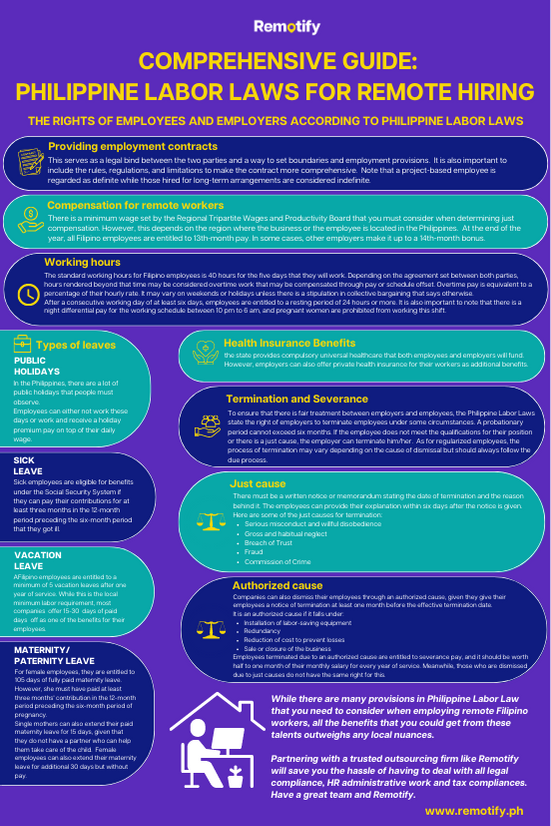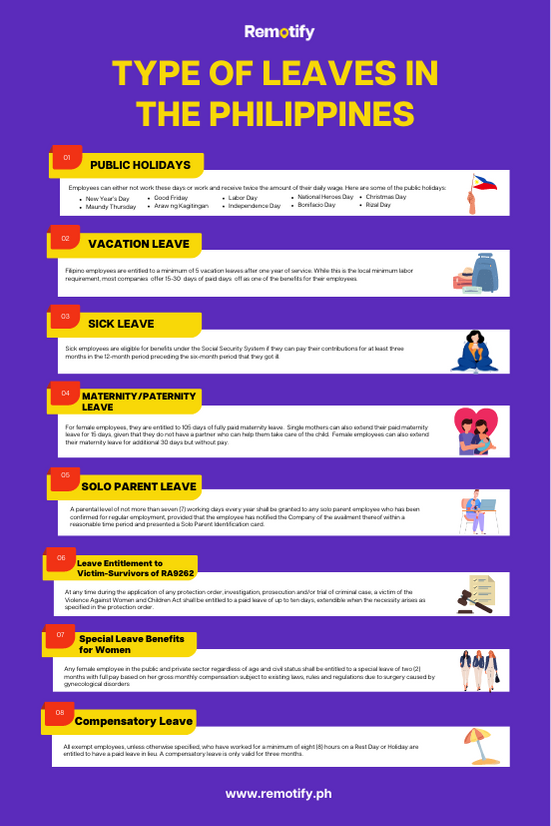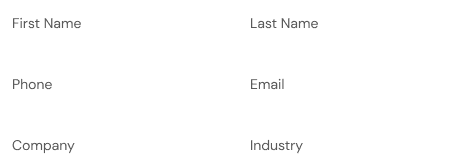
When planning to outsource your team legally from another country, it is important to consider the local employment regulations and processes you must follow. Thus, to hire remote workers in the Philippines, you must familiarize yourself first with the Philippine Labor Code. However, there are a lot of notable differences between this law from other countries worldwide.
So, to help you prepare for hiring remotely in the Philippines, here is a comprehensive guide on Philippine Labor Laws.
The Rights of Employees and Employers According to Philippine Labor Laws

While it is excellent to maintain international relations in your business, notable differences in culture and laws can hinder building employer-employee relationships. To build a great relationship with your remote workers and encourage employee retention in your company, it is crucial to stay compliant with your employee’s local labor laws.
However, it is also important to note that employers also have their own set of rights, especially regarding employee management, termination, and type of employment offer.
Providing employment contracts
Beneficial to both parties, having an employment contract presented by the employer is one of an employee’s rights. This serves as a legal bind between the two parties and a way to set boundaries and employment provisions.
An employment contract must include the following:
- Full name of the parties
- Job position, description, and status
- Pay rate
- Benefits of the employee
It is also important to include the rules, regulations, and limitations to make the contract more comprehensive.
Note that a project-based employee is regarded as definite while those hired for long-term arrangements are considered indefinite.
Compensation for remote workers
When talking about employment, compensation is one of the important things that an employer must come to an agreement with the employee.
Aside from the agreement from both parties, there is a minimum wage set by the Regional Tripartite Wages and Productivity Board that you must consider when determining just compensation. However, this depends on the region where the business or the employee is located in the Philippines.
At the end of the year, all Filipino employees are entitled to 13th-month pay. In some cases, other employers make it up to a 14th-month bonus.
Working hours
The standard working hours for Filipino employees is 40 hours for the five days that they will work. Depending on the agreement set between both parties, hours rendered beyond that time may be considered overtime work that may be compensated through pay or schedule offset. Overtime pay is equivalent to a percentage of their hourly rate. It may vary on weekends or holidays unless there is a stipulation in collective bargaining that says otherwise.
After a consecutive working day of at least six days, employees are entitled to a resting period of 24 hours or more. It is also important to note that there is a night differential pay for the working schedule between 10 pm to 6 am, and pregnant women are prohibited from working this shift.
Public holidays

In the Philippines, there are a lot of public holidays that people must observe. Employees can either not work these days or work and receive twice the amount of their daily wage.
Here are some of the public holidays:
- New Year’s Day
- Maundy Thursday
- Good Friday
- Araw ng Kagitingan
- Labor Day
- Independence Day
- National Heroes Day
- Bonifacio Day
- Christmas Day
- Rizal Day
Vacation Leave
Aside from public holidays, all regular Filipino employees are entitled to a minimum of 5 vacation leaves after one year of service. However, some companies offer over 15 days of leave as one of the benefits for their employees.
Sick leave
Although employers are not required to offer sick leave to their employees, it is still customary for companies to offer their employees 15 sick leaves.
In addition, sick employees are eligible for benefits under the Social Security System if they can pay their contributions for at least three months in the 12-month period preceding the six-month period that they got ill.
Maternity/Paternity Leave
For female employees, they are entitled to 105 days of fully paid maternity leave. However, she must have paid at least three months' contribution in the 12-month period preceding the six-month period of pregnancy. Single mothers can also extend their paid maternity leave for 15 days, given that they do not have a partner who can help them take care of the child. Female employees can also extend their maternity leave for additional 30 days but without pay.
Meanwhile, male employees have a minimum of 7 days of paternity leave, and women can transfer up to 7 additional leaves to their husbands.
Health Insurance Benefits
To ensure the health of Filipino employees, the state provides compulsory universal healthcare that both employees and employers will fund. However, employers can also offer private health insurance for their workers as additional benefits.
Termination and Severance
To ensure that there is fair treatment between employers and employees, the Philippine Labor Laws state the right of employers to terminate employees under some circumstances. A probationary period cannot exceed six months. If the employee does not meet the qualifications for their position or there is a just cause, the employer can terminate him/her.
As for regularized employees, the process of termination may vary depending on the cause of dismissal.
Just cause
If it is due to a just cause, there must be a written notice or memorandum stating the date of termination and the reason behind it. The employees can provide their explanation within six days after the notice is given.
Here are some of the just causes for termination:
- Serious misconduct and willful disobedience
- Gross and habitual neglect
- Breach of Trust
- Fraud
- Commission of Crime
Authorized cause
Meanwhile, companies can also dismiss their employees through an authorized cause, given they give their employees a notice of termination at least one month before the effective termination date.
It is an authorized cause if it falls under:
- Installation of labor-saving equipment
- Redundancy
- Reduction of cost to prevent losses
- Sale or closure of the business
Employees terminated due to an authorized cause are entitled to severance pay, and it should be worth half to one month of their monthly salary for every year of service. Meanwhile, those who are dismissed due to just causes do not have the same right for this.
Understanding laws apart from your own country’s can be challenging and time-consuming. It is also prone to misunderstanding and mistakes, which may cause legal issues for cross-border employment.
Make employment more convenient through EOR services
We understand how complex studying Philippine Labor Laws can be, which is why engaging with an Employer of Record company like Remotify can help you cut through the complexities and simplify the way you outsource and expand your team.
Our EOR services include the following:
- Facilitating Contracts
- Labor compliance
- HR services
- Payroll Management
- Employee Engagement
We also provide you with options to:
- Provide health insurances and other benefits
- Source employees
- Conduct background checks for new and existing employees
- Train your team for GDPR and cyber-security
- Purchase laptops for your team
This makes the employment process more convenient and less troublesome in terms of legalities and labor compliance. It is one reason why many companies who are planning to extend their team in the Philippines prefer working with EOR companies rather than setting up their entity.
Aside from that, Remotify also offers ongoing support for businesses like HR services and payroll management. We aim to maintain a great employee-employer engagement between the parties for better work performance and relationships.
Conclusion
While there are many provisions in Philippine Labor Law that you need to consider when employing remote Filipino workers, all the benefits that you could get from these talents will still be worth it. However, if you want a convenient, simplified, and legal employment process, you should partner with an EOR company like Remotify.
Learn more about the services we offer by visiting our page here.
FAQs
A. Are There Any Legal or Regulatory Restrictions for Hiring Remote Employees from the Philippines?
Ans. Yes, there are certain legal requirements that employers need to be aware of when hiring remote workers from the Philippines. These include obtaining a business permit or license, registering with the Bureau of Internal Revenue and Social Security System in the Philippines, registering at the Securities and Exchange Commission (SEC) and compliance with labor laws and other employment regulations.
B. How Can I Ensure Proper Communication and Collaboration With My Philippine Team?
Ans. Employers of Record (EOR) can help to ensure proper communication and collaboration between employers and their Philippine remote workers. An EOR provides a single point of contact for employers, allowing them to easily manage payroll, benefits, taxes, and other compliance-related matters related to hiring Filipino remote workers. They also provide support in arrangement of the necessary legal and regulatory requirements, as well as offering additional services such as dispute resolution, employee engagement, and healthcare .
C. What is the minimum wage in the Philippines?
Ans. The current minimum wage starts from PHP 573 per day, depending on region and sector. The minimum wage for workers in the Philippines is set by the Regional Tripartite Wages and Productivity Board (RTWPB).
D. How much is overtime pay in the Philippines?
Ans. For hours worked over eight hours per day or 48 hours per week between 10pm and 6pm, there is an overtime bonus ranging from 10% to 35% depending upon the work timings. Holidays are also subject to a different rate which ranges from 130% to 200% of the employees salary depending on the kind of holiday.
E. How to pay remote employees in the Philippines?
Ans. Employers of Record (EOR) can help with the payment process for Philippine remote employees by managing payroll, benefits, taxes, and other compliance-related matters. This eliminates the need for employers to establish a separate legal entity in the Philippines to pay their remote workers, saving them time and money in the long run.
F. What are the typical working hours of remote workers in the Philippines?
Ans. The Philippines has a 24/7 work culture. Employees will work during the hours required by the client. If that means working at night, employees will have no problem with it.
About Remotify
Remotify is your next-generation solution to growing your team remotely and cost-effectively in the Philippines.
Through our Employer of Record services, Remotify will employ and payroll your workers in the Philippines and do the heavy lifting for you. We will take care of local HR, compliance, attendance tracking, payroll, and reporting so you can focus on what is most important: growing your business.
This means you can quickly and securely hire employees in the Philippines, attracting top talents and keeping them engaged through the process. At the same time, you avoid the overhead of establishing your own entity.
From complex local tax and labor laws to in-country capital requirements and compliant HR management, payroll, and benefits disbursement, getting started in a new country to tap on its low cost and great talents can be a time-consuming endeavour. But with the right partner, it doesn’t have to be. Remotify is here to keep things simple for you.
Jump straight to a key chapter
Spending Too
Much Time
Onboarding?
your remote hiring in the
Philippines, excellently.
Say Goodbye to High Costs!
Request Your Free Consultation Today andSave a Massive 70% on Your Workforce!

Ready to thrive in a remote-first work environment?


